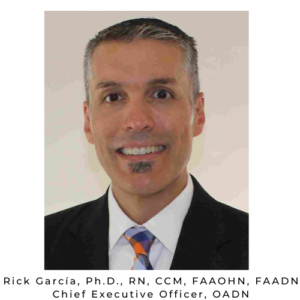February 1, 2023

Happy New Year! I trust 2023 is off to a great start for everyone. At the OADN Headquarters we are fully engaged and working on our organizational strategic direction plan, which the Board of Directors developed last February. While all three strategic direction priorities are equally important for our organizational health and success, I would like to highlight what I believe is one of OADN’s most important member benefits: advocacy. As you know, OADN is the national voice and a pivotal resource for community college nursing and the associate degree pathway. You, our extraordinary members, embody this mission of OADN through the work you do each day at your colleges to cultivate a robust nursing workforce that reflects the rich diversity of the communities you serve. Advocating for you is paramount to our ongoing efforts to engage in, and strengthen, inter-professional collaborations that collectively advance community college nursing education and amplify the voice of associate degree nursing.
My esteemed predecessor, OADN CEO Emeritus Donna Meyer, worked tirelessly to ensure OADN had a seat at every national table where education and health care policy decisions impacting associate degree nursing programs were made. Promoting diversity and inclusion in the nation’s nursing workforce to improve health equity for our patients and our communities is central to the advocacy work we do at OADN. To achieve this, OADN partnered with the George Washington University and Fitzhugh Mullan Institute’s Social Mission Alliance, which is a national movement focused on transforming health professions education to advance health equity. In 2019, OADN and SMA collaborated to assess the feasibility of adapting the Social Mission Metrics Initiative (SMMI) Self-Assessment Survey, which had been disseminated to baccalaureate and masters’ levels nursing programs, to ADN programs. The OADN Social Mission Task Force assisted with the development of the SMMI Self-Assessment Survey for ADN programs, and a small pilot program for OADN program members launched in 2021. Now, we have an unprecedented opportunity to capture much needed data on health equity in associate degree nursing programs through dissemination of the SMMI Self-Assessment Survey to all OADN program leaders across the country.
We see the significant impact our ADN graduates have in our communities and how they are uniquely positioned to address the social determinants of health and health inequities through their nursing practice. However, we do not have national data on social mission in associate degree nursing education, which is essential in any effort to drive meaningful change. As OADN President Karen LaMartina, stated “This data will help amplify the voice of community college nursing education and call attention to the importance of the associate degree pathway in addressing racial and social inequities and address the social determinants of health affecting the communities we serve across the country.” Over the next few months, we will be sending out communications about the SMMI Survey for Associate Degree Nursing with an urgent request that our OADN member school leaders participate in this important and timely initiative. You may ask, what’s in it for me? Great question! SMMI survey participants will be provided a mechanism to assess their individual program’s social mission as well as a benchmark tool to compare it with national norms. This data may be used in your own institutional self-study for annual reports to your national nursing accrediting body. As you know, many of the national nursing accrediting bodies have specific criterion that must address how programs meet these criterion/elements in their curriculum. Having this specialized social mission data for your program will allow you to identify strengths and development opportunities while also meeting your programmatic accreditation needs.
I understand that time is our most valued commodity, so I would like to thank you in advance for your participation with the SMMI Self-Assessment Survey when it launches in the coming weeks. Your contribution to this critically important effort will generate the data we need for OADN to strengthen our advocacy role in promoting the value of the associate degree pathway as an entry point into the nursing profession. It will also amplify our collective voice and impact by demonstrating how essential community college nursing programs are to our nation’s health care workforce.
With heartfelt appreciation,

Rick García, Ph.D., RN, CCM, FAAOHN, FAADN
Chief Executive Officer
OADN and OADN Foundation